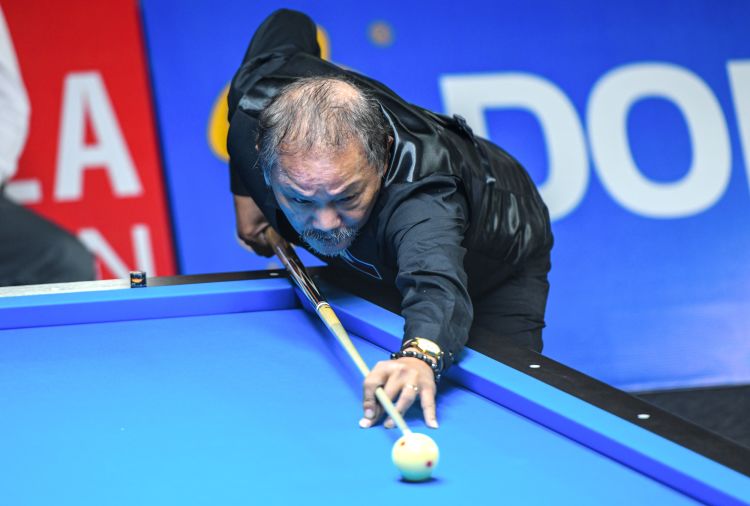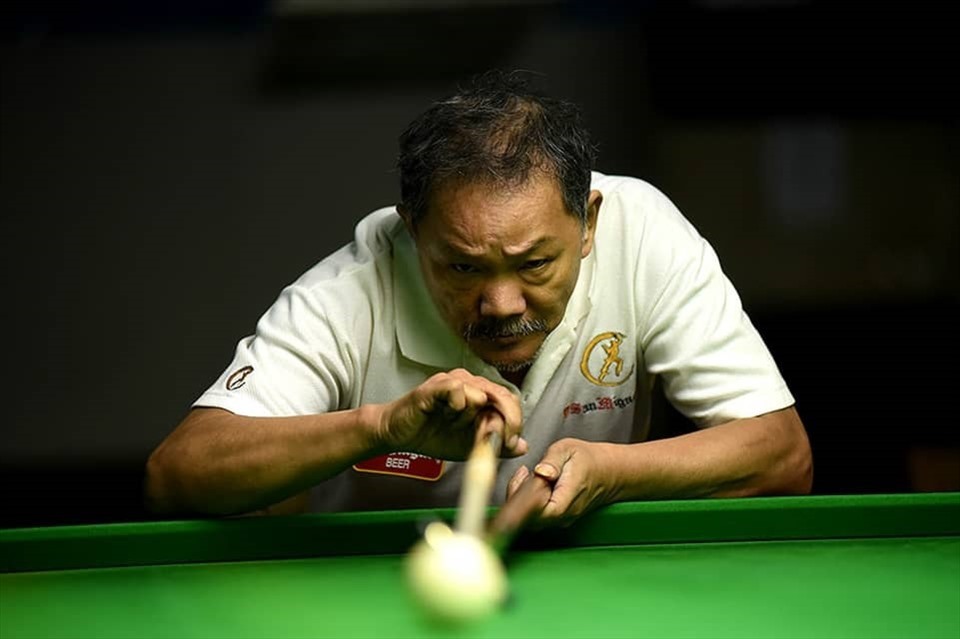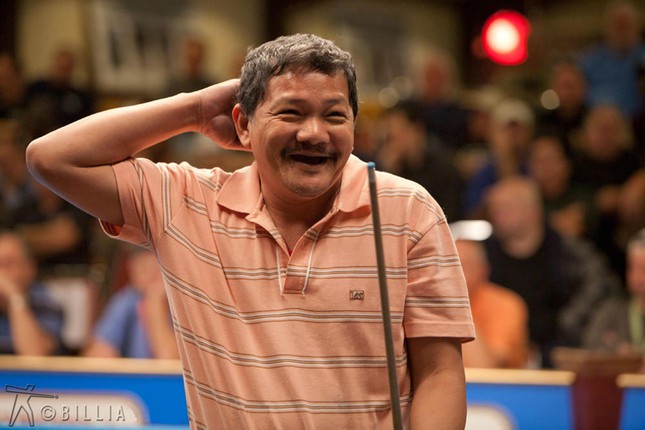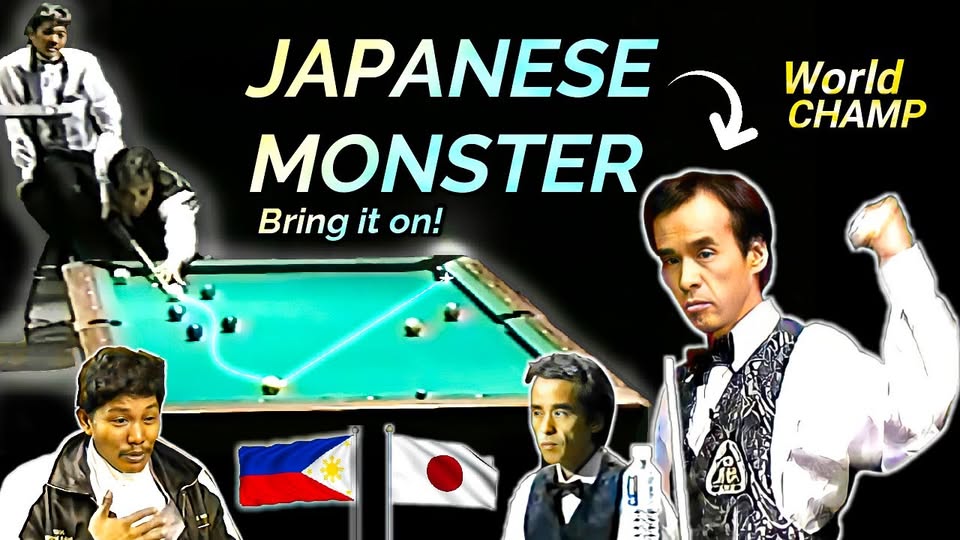In the 1980s and 1990s, the United States was the undisputed kingdom of pool. Names like Mike Sigel, Buddy Hall, Earl Strickland, and Nick Varner dominated tournaments and money matches with a bold, fast, and powerful style that defined the American game. They were kings of the cue, larger-than-life personalities who seemed untouchable.
Then came a quiet man from the Philippines who changed everything. His name was Efren Reyes, and his arrival shook American pool to its core.

A Whisper in the Halls
The legend began with rumors. In smoky poolrooms from New York to Los Angeles, whispers circulated about a mysterious Filipino newcomer. He was registered under the false name Cesar Morales
, a disguise meant to keep him under the radar. But his cue spoke louder than any name on a scoresheet.
Night after night, he dismantled opponents who didn’t know what hit them. Champions walked in confident and walked out humbled. At first, many thought his impossible shots were lucky flukes. But as he kept winning, pulling off miracles again and again, it became clear: this wasn’t luck. This was mastery.
A Different Kind of Game
While Americans thrived on power and speed, Efren thrived on touch, angles, and patience. He saw the table like a chessboard, always two or three moves ahead. Where others smashed, he finessed. Where others forced, he waited.
He had grown up in Manila’s harsh pool halls, playing for money from a young age. There were no coaches, no luxuries — just survival. Every match was a lesson in resilience and creativity. By the time he set foot in America, he was sharper than any cue tip in the country.
Earl Strickland, himself a fiery legend, summed it up best: “Efren sees shots no one else can. He gets inside your head.” It wasn’t just technique. It was psychological warfare delivered with a calm smile.

Breaking History
The breakthrough came in 1994. At the US Open Nine-Ball Championship, Reyes made history by becoming the first non-American ever to lift the trophy. And he didn’t just win — he dominated, leaving seasoned pros shell-shocked.
To the crowd, it looked like magic. To Efren, it was simply pool. His face, unassuming and warm, beamed with joy as he realized he had conquered America’s most prestigious event. A door that had once been tightly shut was now wide open.
The Color of Money Match
Two years later, the legend reached mythic status. In 1996, Reyes faced Earl Strickland in a match that would go down as one of the most famous in pool history: the “Color of Money” challenge. The format was brutal — a race to 120 racks, with $100,000 on the line.
It was a clash of styles and personalities. Strickland, fiery and aggressive, versus Reyes, quiet and calculating. Over days of relentless competition, Efren’s precision, defense, and tactical genius wore Strickland down. When the final ball dropped, Reyes had not only claimed the money but also the respect of an American crowd that had never seen anything like him before.

Redefining the Game
From then on, American giants — Johnny Archer, Nick Varner, Buddy Hall, even a young Shane Van Boening — all fell to him. They played checkers. Efren played chess.
His mastery of kick shots, safety play, and positional control was unmatched. Shots that seemed impossible — caroms off multiple rails, escapes from hopeless snookers — became trademarks of his style. And he did it all without theatrics. No chest-thumping, no trash talk. Just calm precision and humility.
Respect Earned Worldwide
Even his fiercest rivals admitted defeat. After one particularly lopsided tournament final in Houston, Billy Johnson confessed: “That’s the greatest player I’ve ever seen.”
At first, many accused Efren’s brilliance of being luck. But as the years passed and the titles piled up, everyone realized: it wasn’t luck. It was genius forged in the crucible of Manila’s pool halls.

The Filipino Way
What made Efren’s rise even more remarkable was his background. In the Philippines, pool wasn’t just a pastime — it was a lifeline. Games were played for food money, survival hinged on every shot. Compared to the relative comfort of American players, Reyes carried with him the toughness of someone who had fought for every rack.
That difference shaped him. He didn’t just play pool. He embodied it.
The Magician’s Legacy
Today, Efren “Bata” Reyes is not just a champion. He is the champion — a legend who transcended national borders and changed how the world saw pool. He humbled giants, inspired countless young players, and showed that genius could emerge from the most unlikely places.
Ask any fan, and they’ll tell you: Efren didn’t just defeat America’s best. He transformed the very language of the game. With every impossible kick, every calm safety, every quiet smile, he turned pool into art.

Final Thoughts
In the end, that’s why Efren Reyes is called The Magician. He didn’t need flashy celebrations or big talk. His cue did all the speaking. And what it said was unforgettable: that greatness isn’t loud, but precise, humble, and undeniable.
Efren didn’t just win titles. He changed the game forever.

